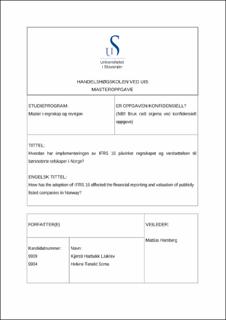| dc.contributor.advisor | Hamberg, Mattias | |
| dc.contributor.author | Liaklev, Kjersti Harbakk | |
| dc.contributor.author | Soma, Helene Tenold | |
| dc.date.accessioned | 2021-09-29T16:29:29Z | |
| dc.date.available | 2021-09-29T16:29:29Z | |
| dc.date.issued | 2021 | |
| dc.identifier | no.uis:inspera:82499923:48527558 | |
| dc.identifier.uri | https://hdl.handle.net/11250/2786301 | |
| dc.description.abstract | Formålet med vår masteroppgave har vært å undersøke hvordan implementeringen av
IFRS 16 har påvirket regnskapet og verdsettelsen til børsnoterte selskaper. I januar 2019 var alle selskaper som rapporterer etter IFRS pliktet til å ta i bruk den nye standarden, og det innebar at flere leieavtaler måtte balanseføres. IAS 17 som tidligere ble benyttet, skilte mellom operasjonelle og finansielle leieavtaler. Det var bare de finansielle leieavtalene som skulle inngå i balansen, og det var enkelt å strukturere avtalene slik at selskapene unngikk balanseføring. Endringen av regnskapsprinsipp i 2019 har ført til at flere nøkkeltall og verdsettelsesmodeller påvirkes, og det var dermed interessant å undersøke om den nye regnskapsinformasjonen også resulterte i endringer i aksjekursen.
For å forsøke å finne svar på dette valgte vi å utlede tre studier. I den første studien undersøkte vi hvordan finansanalytikerne hensyntar leieavtaler i verdsettelsen av selskapene. Basert på svarene i spørreundersøkelsen kom vi frem til at den nye standarden hadde liten betydning for verdsettelsen. IFRS 16 førte til at tallene reflekterer selskapene bedre og det er enklere å sammenligne selskapene, men den har ikke gjort jobben for de fleste finansanalytikerne enklere da det fortsatt kreves omarbeidelser. Finansanalytikerne trodde heller ikke at aksjekursene ville bli påvirket av implementeringen.
I den andre studien undersøkte vi hvordan selskapene på Oslo Børs ville bli påvirket av implementeringen. Studien viste at det var stor variasjon i hvor mye leieavtaler selskapene hadde, og at noen bransjer vil bli påvirket mer enn andre. Vi kunne se at kapitalstrukturen i selskapet ble påvirket for selskapene med mye leieavtaler i balansen ettersom leieforpliktelsene har økt gjeldsgraden. Dette har igjen ført til at kapitalkostnaden kan ha blitt påvirket da gjeldsandelen har økt.
I investeringsstrategien i den tredje studien undersøkte vi om aksjeprisene har blitt påvirket som følge av ny regnskapsinformasjon. Ved å sette sammen porteføljen med mest leieavtaler og porteføljen uten leieavtaler fant vi at det ikke var noen statistisk signifikans mellom porteføljene, og derav at aksjeprisene ikke har blitt påvirket av IFRS 16.
Resultatene viser at selskapenes regnskap og kapitalstruktur blir påvirket. Finansanalytikernes praksis påvirkes i noen grad, men ikke vurderingen av selskapene. Det er derimot ingenting som tyder på at aksjeprisene har blitt påvirket som følge av implementeringen av IFRS 16. | |
| dc.description.abstract | The purpose of our master’s thesis is to research how the adoption of IFRS 16 has affected the financial reporting and valuation of publicly listed companies in Norway. In January 2019, companies who used IFRS as their financial reporting framework were required to adopt the new standard for lease agreements. This implied that more leases would have to be capitalized. IAS 17, the previous accounting standard for lease agreements, distinguished between operational and financial leases. It was only the financial leases that were included in the statement of financial position, and it was easy to structure leases to avoid them being capitalized. The change in the accounting principles in 2019 has led to several key figures and valuation models being affected. It was therefore interesting to research if the new accounting information resulted in changes in the stock price.
To find the answer we chose to conduct three studies. In the first study we researched how financial analysts take into account leases in the valuation of a company. Based on the answers given in the survey we came to the realization that the new accounting standard had little impact on the valuation. The implementation of IFRS 16 led to the accounting numbers being more reflective and made the companies accounting numbers more comparable. On the other hand, it has not made the work of financial analysts any easier because the numbers still require adjustments. The financial analysts did not believe that the stock prices would be impacted by the implementation.
In the second study we researched how the companies on the Oslo Stock exchange was impacted by the implementation. The study showed a great variation in the amount of leases companies had, and that some industries would be impacted more than others. We could see that the capital structure in companies with high amounts of leases capitalized has changed since the lease liabilities have increased the debt ratio. This again has led to the capital cost potentially being impacted and an increase in both the debt-to-equity ratio and the debt-to-capital ratio.
In the third study we performed an investment strategy to research whether the stock price had been impacted as a result of the new accounting information. We did this by collecting a portfolio for the companies with the most leases capitalized and the companies without any leases. From this, we found that there was no statistically significant difference between them and that there was no impact on the stock price from the implementation of IFRS 16.
The results show that the company's financial reporting and the capital structure has been impacted by the new standard for lease agreements. Financial analysts’ practice has been affected in a smaller sense but not the valuation of the companies. There is nothing that suggests that the stock price has been affected by the implementation of IFRS 16. | |
| dc.language | nob | |
| dc.publisher | uis | |
| dc.title | Hvordan har implementeringen av IFRS 16 påvirket regnskapet og verdsettelsen til børsnoterte selskaper i Norge? | |
| dc.type | Master thesis | |
